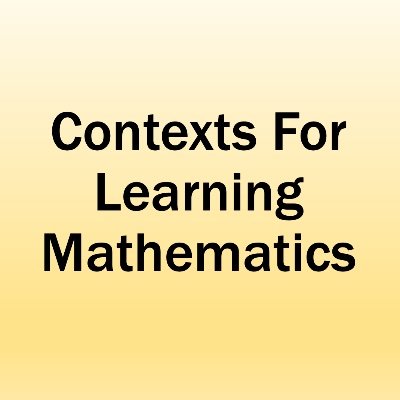
Contexts for Learning Mathematics
@CFLM_math
Followers
2,540
Following
1,892
Media
1,062
Statuses
2,856
Contexts for Learning Mathematics is a K-5 inquiry-based math curriculum by Catherine Fosnot & Associates with an online classroom video teacher support system.
Joined February 2021
Don't wanna be here?
Send us removal request.
Explore trending content on Musk Viewer
#NevaPlay
• 529397 Tweets
SAROCHA X MODERN GURU
• 452359 Tweets
Tzuyu
• 370974 Tweets
Chiefs
• 366678 Tweets
namjoon
• 293632 Tweets
Ravens
• 260687 Tweets
Lamar
• 117474 Tweets
Adalet
• 91262 Tweets
Chester
• 70675 Tweets
#ZeeNunew1stFMinJapan
• 69931 Tweets
サブスク解禁
• 38644 Tweets
小泉進次郎
• 36415 Tweets
Hayırlı Cumalar
• 35239 Tweets
FANZA
• 32149 Tweets
小泉さん
• 22358 Tweets
MUSINSA BEAUTY WITH KARINA
• 20710 Tweets
TransisiSEJUK PRABOWOJKW
• 20082 Tweets
モモンガ
• 19339 Tweets
KitaKOMPAK KitaMENANG
• 19218 Tweets
ちいかわ寿司
• 17666 Tweets
アストロボット
• 17576 Tweets
資さんうどん
• 16085 Tweets
知的レベル
• 15875 Tweets
すかいらーく
• 15374 Tweets
KPLC
• 15187 Tweets
進次郎さん
• 12639 Tweets
資さん買収
• 12605 Tweets
Engin Polat
• 12372 Tweets
ベイマックス
• 11864 Tweets
PRETTY GIRL ERA MILKLOVE
• 11594 Tweets
Last Seen Profiles
Each time one prematurely teaches a child something he could have discovered himself, that child is kept from inventing it and consequently from understanding it completely.
― Jean Piaget, 1970
#iteachmath
#mtbos
#elemmathchat
0
29
78
Because memorizing procedures can often require kids to treat the numbers in each step as digits, they often lose sight of the quantities they are actually working with.
In this way, memorizing procedures get in the way of sense-making.
#mtbos
#iteachmath
#elemmathchat
2
15
51
Each time one prematurely teaches a child something he could have discovered himself, that child is kept from inventing it and consequently from understanding it completely.
- Jean Piaget, 1970
#mtbos
#iteachmath
#elemmathchat
0
12
40
Number Talks vs Number Strings
Get ready to be blown away by this session hosted by Christina Tondevold
@BuildMathMinds
with Cathy Fosnot on the difference between number talks and number strings.
0
20
34
The hallmark of numeracy is to look to the numbers first before deciding on a strategy.
It’s this kind of numeracy that we should be striving for, and a mathematics program needs to support teachers and kids in getting there.
#MTBOS
#iteachmath
#elemmathchat
0
17
30
Please do
#numberstrings
!
Memorizing facts with flash cards or through drill and practice worksheets will not develop the important relationships needed for fluency.
Teaching facts for automaticity, in contrast, relies on thinking.
See some at
0
13
31
If you have never done a number string with time on the
@mathrack
clock, you're missing out!
Check out the awesome Math Rack Clock and our new 1st and 2nd grade units on time at
1
9
27
Developing number sense takes time.
Algorithms taught too early work against the development of good number sense.
#MTBOS
#iteachmath
#elemmathchat
#NCTMLA22
0
6
27
Does your math curriculum support the development of the most important big ideas, strategies and models?
See Cathy build the landscape of multiplication that serves as the backbone of all of our multiplication units!
#elemmathchat
#mtbos
#iteachmath
0
7
25
With enough practice and feedback, humans can be taught to perform arithmetic algorithms.
The problem is that mathematics and numeracy (in contrast to arithmetic) require thinking, not just routinized behaviors.
#iteachmath
#mtbos
0
8
24
Using games in K-1 is a fantastic way to “assess” where kids are in development in the beginning of the year and all year long.
No need for written answer-getting exercises/tests that only show whether they got the right answer to those problems in that format.
I tend to start every year jumping back into
@ctfosnot
@CFLM_math
- exploring how I can tweak games, how I can play around with the games to suit the needs of my new students, & discovering new things within them that I may not have noticed previously.
#yrdsbmath
#earlyyears
0
2
13
0
8
23
Do you love number strings?
All of our units use number strings to support automaticity and fluency.
Even better, teachers can observe other teachers facilitating dozens of strings like this one using our online classroom video library.
#numberstrings
0
7
23
Conferring in math workshop is not about introducing new skills/concepts from a list of objectives, nor helping kids to get the right answer.
It’s about supporting the development of a young mathematician to become a better, more competent, mathematician.
#mtbos
#iteachmath
0
5
20
We even take the topic of “time” seriously at
Check out the math rack clocks at
@mathrack20
and use them in our new units on time.
0
9
19
In the Contexts for Learning Mathematics curriculum, we use math workshop every day.
Wanna know why?
Check out our new website to find out!
#iteachmath
#mtbos
1
10
19
By abandoning the rote teaching of algorithms, we are asking children to learn more.
We are teaching them to mathematize, to think like mathematicians, to look at the numbers before they calculate.
#mtbos
#iteachmath
#elemmathchat
1
9
19
Developing number sense takes time.
Algorithms taught too early work against the development of good number sense.
#MTBOS
#iteachmath
#elemmathchat
#nwmc22
0
6
19
By abandoning the rote teaching of algorithms, we are asking children to learn more.
We are teaching them to mathematize, to think like mathematicians, to look at the numbers before they calculate.
#buildingthinkingclassrooms
0
11
18
Teaching mathematics is about facilitating mathematical development.
This means that we cannot get all learners to the same landmarks at the same time in the same way, any more than we can get all toddlers to walk at the same time in the same way.
#mtbos
#iteachmath
0
2
17
During
#numberstrings
, it’s important to remember that...
We represent children’s thinking, not just their answers.
Different forms of representation support different noticing’s.
0
8
18
Heard about the Rekenrek or math rack, but not sure how/why to use it?
We love teaming up with
@mathrack20
to support automatization of the basic facts.
0
5
18
Whenever we sit down to confer with a developing mathematician, we have to remind ourselves that the goal is to support the development of the young mathematicians sitting next to us.
It is not to fix the piece of mathematics.
#mtbos
#iteachmath
0
5
17
Developing number sense takes time.
Algorithms taught too early work against the development of good number sense.
#iteachmath
1
2
15
The first string in this unit is beautiful.
Modeled on the open double number line.
Try it! It's awesome.
1/2 x 36
1/4 x 36
1/8 x 36
5/8 x 36
7/8 x 36
5/8 x 48
#mtbos
#iteachmath
0
3
16
Curious?
Check out
@mathrack20
and how we use the math rack clock in grades 1 and 2 units focused on the development of the Measurement of Time.
#iteachmath
#elemmathchat
0
8
14
Have you ever seen Cathy Fosnot
@ctfosnot
build one of her landscapes?
Sit back and be amazed for 5 minutes.
0
5
15
Gallery walks...an important part of the process of developing a mathematical argument.
Critiquing the reasoning of others.
#iteachmath
#mtbos
#elemmathchat
0
1
15
“There is no way you are going to get through this number string without a conversation on the distributive property."
10x13
2x13
12x13
20x13
22x13
19x13
Analyze
#numberstrings
with Cathy Fosnot on our online classroom video platform.
Here’s just a taste from the platform...
1
7
15












































